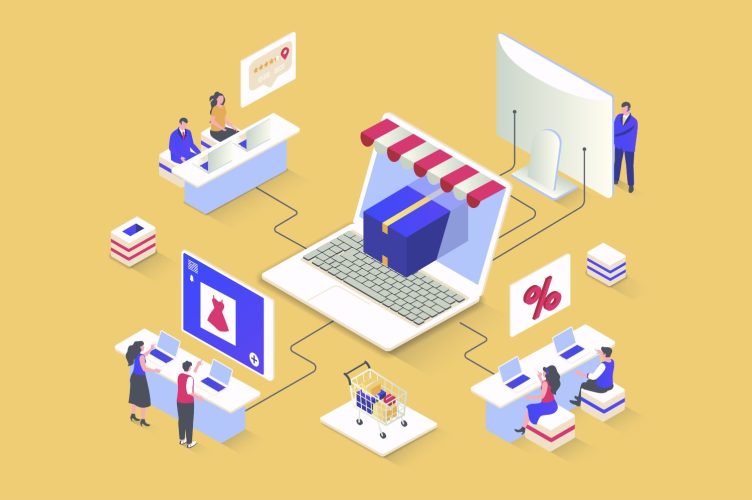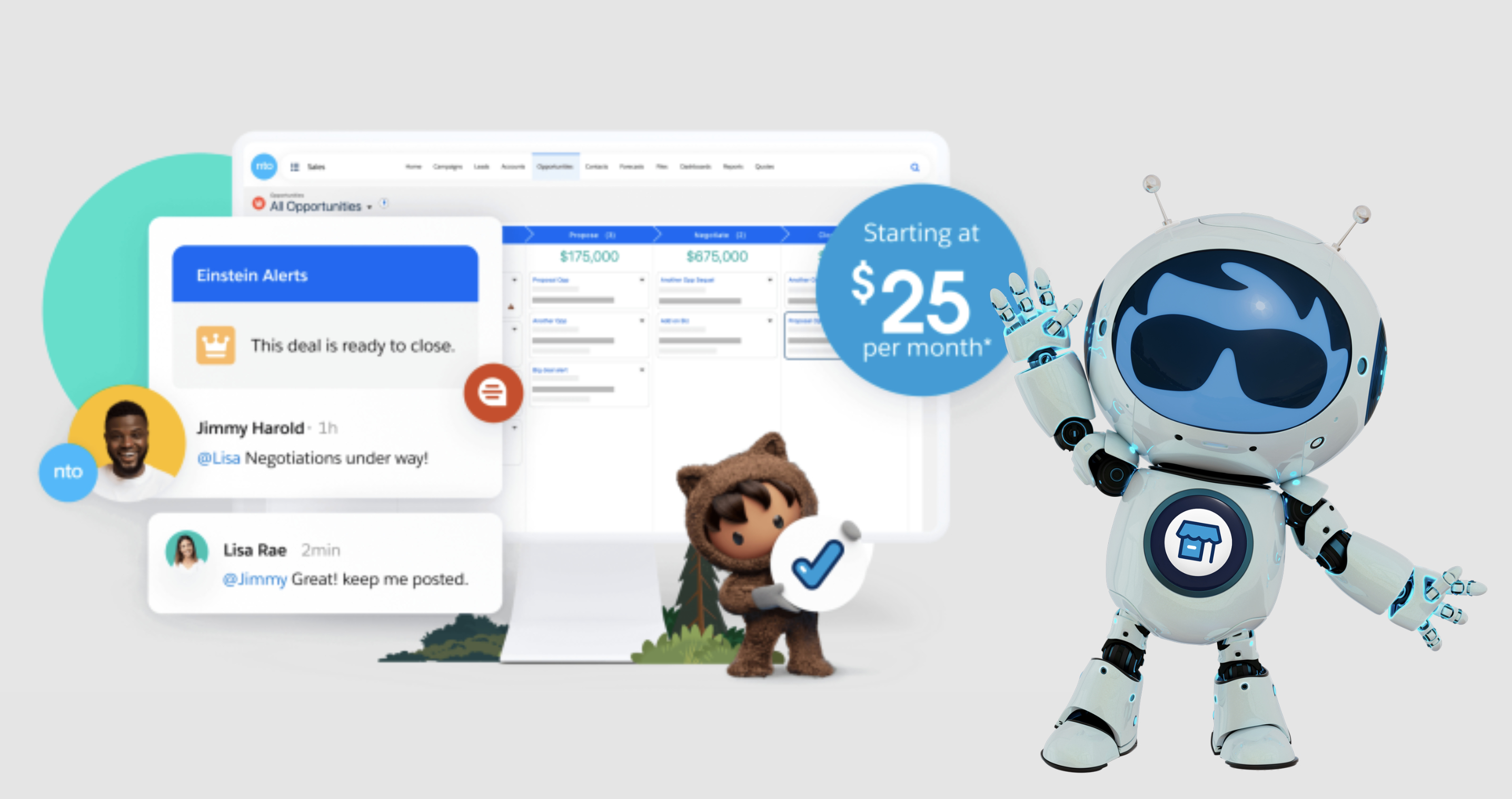When you’re running an ecommerce store, the chances are that you keep track of thousands of moving pieces every single day. You have to maintain inventory, help customers, and stay on top of trends — all at once. Luckily, with artificial intelligence (AI), you got this. AI offers an equal footing for small and medium-sized business (SMB) owners competing with big retailers through diverse tools and resources. It’s like having a team of experts working 24/7 to help you succeed.
Commerce AI makes shopping more personal for your customers with product recommendations and personal shoppers. It enables you to make better inventory, pricing, and marketing decisions by analyzing customer data and predicting what’ll sell best. In this article, we’ll share tips on how to use AI to optimize your ecommerce store.
What you’ll learn:
- Importance of AI in ecommerce
- How can AI help small businesses?
- Seven tips to optimize your ecommerce store with AI
- Optimizing your ecommerce store with AI
Importance of AI in ecommerce
Ecommerce growth coexists with AI. There’s a reason why a whopping 73% of customers feel brands treat them as unique individuals — a significant rise from 39% in 2023. AI significantly helps with personalization and marketing, giving SMBs a unique advantage. Besides improving operational efficiencies, sales pipeline and analytics, AI acts like an intuitive assistant in ecommerce. It learns from your customers’ shopping habits to create personalized experiences, showing them products they’re likely to buy and helping them find what they’re looking for.
83% of teams with AI saw revenue growth versus 66% without AI. Because of AI’s accurate predictions, you’ll get insights into which products might sell faster, customize your storefront, and boost your revenue despite minimal resources. Unlike humans, AI or agents like Agentforce are always on duty — resolving customer queries at any hour. They can analyze real-time shopping trends, handle sales queries, and run end-to-end marketing campaigns to help increase conversions.
AI Tools for Small Business
How can AI help small businesses?
75% of SMBs are investing in AI in some capacity, and growing SMBs are 1.8x times more likely to invest in AI. There’s a reason for this — and this quick list of benefits proves why we wax eloquent about AI for SMBs.
- Personalized customer experiences: AI learns from customers’ browsing and buying habits to create tailored shopping experiences, and recommend relevant products.
- Competitive pricing strategies: AI analyzes market trends and competitor prices to help you set optimal pricing while being profitable and competitive.
- Cost-effective marketing: AI offers multiple marketing tools to help you with content creation, email marketing, digital marketing, and targeting ads to the right audiences..
- Improved search functionality: AI-powered search helps customers find what they’re looking for, even if they don’t use the exact product names or descriptions, ultimately leading to higher conversion rates.
- Time-saving automation: AI can handle routine tasks like order processing, email responses, and inventory updates, so you can focus on growth and strategy.
- Fraud detection: AI is your online store’s security guard. It can spot suspicious activities and fraudulent transactions before they flare up.
- Analytics and insights: AI analyzes large volumes of data to provide actionable insights on your ecommerce operations, strategy, sales, and marketing.
- Scalable operations: AI can scale as you scale by handling increased customer volume and complexity without an increase in staff or resources. SMBs find this cost-effective.
- 24/7 customer support: AI-powered chatbots like Agentforce can handle customer questions around the clock, providing instant responses to common queries about shipping, returns, and product information.

Seven tips to optimize your ecommerce store with AI
Ready to get started? Here are some helpful tips and examples to guide your implementation with AI.
1. Personalize, personalize, personalize — with AI
AI gets smarter with every customer interaction, remembering preferences and anticipating needs to help offer tailored shopping experiences to your customers. From past purchases and browsing habits to service conversations and sentiment analysis, AI analyzes everything to help customers move forward through the purchasing funnel. Based on these insights, AI will help your customers discover new products through customized recommendations or contextual marketing. This helps you win customer loyalty and ultimately boost revenue.
In our latest AI research, personalization leads to more conversions — and that’s why 73% of customers feel brands treat them like unique individuals.
Source: State of the AI Connected Customer
Tips for implementing personalized recommendations
Our research also shows that 60% of consumers admit they’ll become repeat customers if a brand offers personalized shopping experiences.
Check out these tips to further create effective personalized recommendations.
- Set the right metrics: Track metrics beyond your customers’ shopping behavior. Include views, search terms, browsing time, and social sharing to deliver more accurate product recommendations that boost sales.
- Segment your customers into appropriate groups: Customer segmentation can help you tailor recommendations better. AI can segment bargain hunters, luxury shoppers, and seasonal buyers, showing each group different products and price points that match their requirements.
- Test AI recommendations across different touchpoints: Test what works best for your target audience and refine your strategy. Start with simple product pairings, progress to targeted emails, and eventually tailor home page content to match customer preferences.
2. Implement AI-driven search and navigation
Think of AI-powered search as your store’s mind-reading assistant. It can understand what your customers want — even when they type in descriptions like “oversized blue casual shirt” instead of your product’s exact name.
AI gets smarter with every search, learning from how customers interact with results to provide accurate suggestions, whether someone’s searching for “summer dresses” or “affordable headphones”. AI can decipher natural language and vague descriptions, making ecommerce search and navigation more seamless and accurate.
Tips to enhance navigation with AI-powered suggestions
AI-powered navigation learns from every customer’s click and search to create a more personalized shopping path. Using advanced AI like natural language processing (NLP), ecommerce can improve navigation and offer better customer experience. NLP understands natural language queries like “waterproof jacket for winter hiking under $200” and recommends relevant results. The system recognizes intent, product attributes, and price constraints to enhance search feature and increase conversions.
The following tips can further help you.
- Smart predictions and shortcuts: Each customer clicks and creates a different navigation path. AI learns from their actions to show custom shortcuts, favorite categories, and recently viewed items to make future shopping trips faster and easier.
- Search that works for your customers: AI is like a shopping assistant and can understand search terms like “black party dress under $100”. It can also autocomplete searches, automatically correct typos, and offer suggestions based on popular searches.
- Real-time adaptability: AI automatically adjusts your store’s navigation to match how people shop — from reorganizing categories and highlighting seasonal products to recommending complementary items that make sense together. For example, showing phone cases when browsing phones.
3. Automate marketing and customer engagement
Did you know that about 47% of email marketers already use AI to generate email marketing campaigns? You can automate various aspects of marketing, including content creation, email marketing campaigns, lead generation, and lead nurturing.
For SMBs with limited resources and budgets, AI acts like a digital marketing team. AI chatbots and agents like Agentforce can run end-to-end marketing campaigns and engage your customers across various marketing channels, including chat, email, phone, and social media.
Tips for creating engaging and automated marketing campaigns
Businesses can save up to six hours every week by using automation in advertising and social media. These tips to automate your marketing campaigns can be helpful.
- Segment your audience meaningfully: Automated campaigns usually perform better when you target specific audience segments based on behavior, preferences, and past interactions. For example, AI can create different workflows for new subscribers, loyal customers, and less-engaged users to craft messages that resonate with each group.
- Design thoughtful trigger-based journeys: Rather than sending generic emails, use AI to build campaigns around specific customer actions and behaviors. For example, sending an email with a discount coupon or reminders for cart abandonment or a welcome email when someone makes their first purchase. Map out the entire customer journey and create automated touchpoints for key moments that move them toward conversion.
- Test, measure, and optimize continuously: Automated campaigns should never be “set and forget.” You should analyze key metrics and set benchmarks for each segment and message for open rates, click-through rates (CTR), and conversion rates. A/B tests different subject lines, content, and sending times. Use these insights to refine your targeting, messaging, and timing.
4. AI for content generation and optimization
AI can help produce search-engine-optimized (SEO) blog and social media posts and optimize emails while maintaining brand voice and consistency. Product descriptions can make or break any ecommerce site.
You can generate descriptions highlighting key features, benefits, and unique selling points. AI identifies top-performing descriptions, competitor listings, and customer reviews to see which language patterns and keywords drive conversions. Plus, it can analyze content performance data, suggest improvements for SEO, readability, and engagement, and spot trending topics and keywords that resonate with your target audience.
Tips for improving SEO with AI-generated content
68% of shopping experiences start with a search engine. Here’s how you can enhance your ecommerce SEO with AI-generated content.
- Focus on search intent and generating value: Although AI can help generate content, ensure it addresses user search intent and provides valuable insights. Use AI to analyze top-ranking pages for your target keywords, identify content gaps, and generate comprehensive content that answers specific user questions.
- Maintain content uniqueness and originality: To catch your target audience’s attention, offer unique insights, real examples, and industry expertise. Include original research and case studies to differentiate your content from competitors. Avoid generic, duplicate content that search engines may penalize.
- Structure content for featured snippets: AI can help format content and identify opportunities for featured snippets. This means organizing information with clear headers, using bullet points for lists, answering common questions, and including structured data markup.
By implementing AI in your content operations, you can drive success like Neolait. Using Commerce AI, Neolait has generated over 1,300 product descriptions, accelerated the copywriting process while consistently identifying opportunities to update the content as market and customer needs evolve.
5. Gain customer insights and analytics
AI is your copilot for analyzing vast customer data — from shopping patterns and purchase history to cart abandonment rates and browsing behavior. AI can create personalized product recommendations, optimize pricing strategies in real time, and track customer lifetime value (CLV), returning visitors, and brand advocacy. It can track customer journey touchpoints across multiple channels to help you understand which marketing efforts are working and identify friction points in their shopping experience.
Tips for using AI to gain actionable insights
Knowing what to measure is the crux of analytics. The following tips will guide you.
- Define clear metrics: Start with specific, measurable metrics you want to measure rather than analyzing data aimlessly. For example, instead of broadly analyzing “customer behavior,” focus on metrics like “Which product features drive the highest customer retention?” or “What factors best predict cart abandonment?” This focused approach ensures AI analysis produces insights you can act on.
- Combine multiple data sources: Instead of relying on one data source, let AI analyze patterns across customer service interactions, sales data, purchases, and social media engagement simultaneously. This holistic view helps uncover unexpected connections and provides context for better product offerings, marketing, and customer experience decisions.
- Prioritize insights based on impact: Not all insights need immediate action. Use AI to score and rank insights based on potential business impact, implementation cost, and urgency. For instance, if AI identifies a minor user interface (UI) issue and a major pricing opportunity, you’ll know where to focus first. This ensures you act on the insights that drive the most value.
6. Streamline operations with AI agents
SMBs lose an average of over 90 minutes daily when they don’t have access to the right technology. Implementing AI or Agentforce to manage routine tasks can significantly improve productivity and boost morale. Consider delegating order management, inventory management, rule-based pricing, and maintenance work. If your team is lean, having AI handle operations will free you up for strategic work.
Tips for improving operational efficiency
About 47% of global workers prefer AI handling tasks from their jobs. A common use case where you can automate operations is to get AI involved in order fulfillment. If a customer has placed an order on your website, you can count on AI to process the order, communicate with customers and delivery partners, and inform customers regarding delivery and post-delivery feedback.
Here’s how you can improve operational efficiency
- Implement AI-powered inventory management: AI can predict demand patterns, optimize stock levels, and handle reordering processes. This reduces stockouts and overstock situations while minimizing working capital tied up in inventory.
- Deploy AI-driven process automation: Intelligent workflow systems can handle routine tasks, route documents, and make basic decisions autonomously. This frees up your time for more strategic work while reducing errors and processing times.
- Leverage predictive analytics for maintenance: AI can monitor equipment performance, predict potential failures, and schedule preventive maintenance at optimal times. This reduces unexpected downtime, extends equipment life, and improves maintenance costs.
7. Detect fraud and maximize security
AI can help SMBs stay alert and detect fraud early on. You can automate 24/7 monitoring of transactions and systems to AI. This helps you stay protected against financial losses and data breaches without requiring large security teams. Plus, it can effectively scan network and user behavior to detect anomalies and prevent significant security lapses.
Tips for enhancing security measures
74% of finance leaders use AI for financial crime detection and 73% for fraud detection. For example, if you’re experiencing a sudden spike in high-value products, AI can detect if different accounts using the same IP address are placing such orders. If these are newly created accounts showing identical browsing behavior, AI flags them for fraud review and holds the orders.
Look for a customer relationship management (CRM) tool with AI capabilities, as it can manage everything from security and operations to personalization and sales. Commerce for small businesses comes with a digital storefront builder, merchandising tools, analytics, and marketing tools. Plus, it’s easy to set up, making it ideal for small and growing ecommerce businesses like yours.
Here are some ideas for implementing AI in your ecommerce operations.
- Implement AI-driven content moderation: This will help you screen user-generated content, product reviews, and marketplace listings for potential security threats, spam, or inappropriate content that could compromise platform security or user safety.
- Automate security testing: Use AI to scan your platform for vulnerabilities or various attack scenarios continuously. This proactive approach helps identify and fix security defects before malicious attacks occur.
- Implement fraud detection systems: AI can analyze real-time patterns by monitoring customer behavior, transaction data, and device fingerprints. It can automatically flag suspicious activities like unusual purchase amounts, multiple failed payment attempts, or transactions from suspicious IP addresses while learning and adapting to new fraud patterns over time.
Start selling online with Starter Suite.
Set up your storefront, engage customers, and drive growth using an all-in-one platform with integrated tools for every step of the journey.



Optimizing your ecommerce store with AI
Sell like you’ve never sold before. All you need are the right tools.
AI will play a significant role in the future of ecommerce as user behavior and preferences evolve. Hyperpersonalization, voice command, and advanced visual commerce will all rely heavily on AI. Users will prefer virtual try-ons and visual search features, and expect virtual assistants and proactive 24/7 customer support. Get in on the AI action now.
Salesforce gives you all this and more — growing with you as your business grows. Get started with commerce for small business.






























